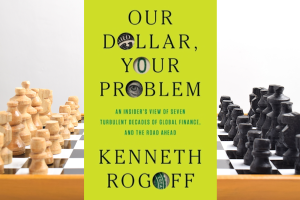Look around and you’ll see that the economic problems facing us today are many. Even worse, the most pressing of these problems pose a daunting challenge even to analyze in their full complexity, let alone solve.
It may seem that implementing any credible solution within current political and economic institutions is at least implausible, if not impossible. So why am I hopeful about the future?
Because I’ve seen that the new economic thinking we so sorely need is being pursued with great enthusiasm by young people around the globe. These are the people who best understand the failures of the current system and possess the creativity to change it.
The good thing about youth is that it does not shy away from a challenge, but rather instinctively embraces it. Climb that peak or ski that backwoods slope, but also throw your mind into exploration of a new approach to unsolved intellectual problems and your energies into overcoming obstacles that have defeated all previous efforts. More than anyone else, the young exemplify the idea that a challenge embraced gives life its meaning.
And in this next generation of innovative thinkers lies the burgeoning potential of the new economic thinking of tomorrow.
But recently that potential has too often been stifled.
In economics, professional education has privileged the mastery of sterile technique over the development of inherent creativity, and professional promotion has put the private game of currying personal favor before the public good of tackling important social problems.
The consequence is that economic thinking has failed to rise to meet the challenges of today, leaving the would-be solutions in the hands of the uninformed. Here is the fundamental origin of the policy failures that surround us today: It is a failure of thinking.
Toward a solution
Everyone knows this, and many deplore it, but the real question is what to do about it.
The basic problem is not so much to inspire the new economic thinkers of tomorrow—they have inspiration aplenty already—but rather to nurture their development and promotion. They are ready to climb the peak, but they need support and encouragement throughout the years of hard training in preparation for the tasks they set themselves.
The road that ultimately leads to climbing the peak is a long one, perhaps decades long. Young scholars are eager to make the journey, and a few will inevitably make it, even without help. But our needs today are greater than what can be supplied by the existing inefficient system of intellectual production that wastes the talents of so many.
Development of a new generation of economic thinkers requires development of a new pipeline through which those thinkers can progress, from novice to journeyman to master. Technology is part of the solution, since it offers to the curious mind access to myriad sources that have been lost in standard economics training. But access without organization is noise, not information. And satisfaction of curiosity is a private pleasure, not necessarily a public good.
Ultimately the new generation of thinkers will have to become self-sustaining, with each stage in the pipeline supporting the development of the one just before. And ultimately this new generation will impose its own organization on the myriad sources at hand, and draw its own conclusions. We cannot know in advance how all this will develop. What is needed now is a pluralist approach, one that widens the range of current economics teaching as a way of widening the range of future economic thinking.
For example, economic history and the history of economic thought offer an incredibly rich diversity of past experience and thoughtful response to that experience. But these subjects are not taught as a standard part of the economics curriculum and hence are not readily available in most educational programs. This can be changed.
Another example: Given the failure of economists to rise to the current challenges, the vacuum is being filled by the works of other social scientists, physicists, and computer scientists. Here again we find a rich diversity of responses, now to current experience, responses that are not taught and hence not readily available to aspiring young economic thinkers. This too can be changed.
Supporting the next generation
This is the task that the Institute for New Economic Thinking is undertaking with its Young Scholars Initiative. Through a host of programs such as special classes, seminars, and summer and winter schools, and other special events, the Institute is supporting the young thinkers of today who want to learn a realistic and relevant economics and want to change the discipline for the better. By providing the infrastructure and material support, as well as the access to leading new economic thinkers like Joseph Stiglitz and Adair Lord Turner, who can serve as mentors, the Institute is leading the charge for the new economics of the future.
The key point is this. New economic thinking requires new economic thinkers. But new economic thinkers have to be produced. New economic teaching and new economic community are the essential inputs to that production. There are young scholars all around the world are endlessly inspired and creative. But they need help and support. Their potential is a resource society cannot afford to waste.
Working with these young scholars every day, I know that we can meet this challenge of giving them the support they need. And that with the right support they can climb that peak. I’m optimistic.
This article originally appeared on Yahoo! Finance





